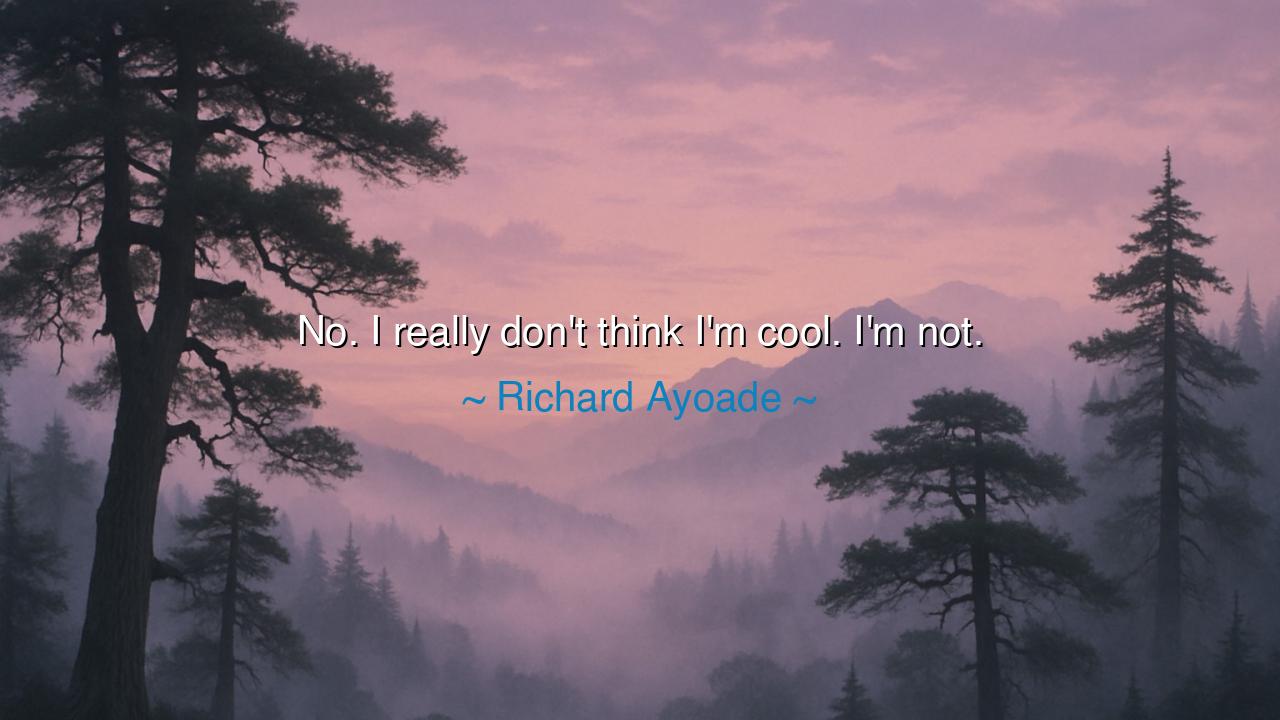
No. I really don't think I'm cool. I'm not.






"No. I really don't think I'm cool. I'm not." These words, spoken by Richard Ayoade, reveal a deep reflection on self-awareness, humility, and the disarming honesty that comes with accepting one’s true nature. In a world obsessed with appearances, where coolness is often equated with status, confidence, and charisma, Ayoade’s rejection of these labels is a refreshing act of authenticity. His refusal to align himself with society's shallow ideals of "coolness" offers a profound lesson in embracing one’s imperfections and quirks. By rejecting the need to be cool, Ayoade frees himself from the burden of living up to others' expectations, allowing him to exist purely as he is—unencumbered by the masks people often wear to gain approval.
This idea resonates with the ancient teachings of Socrates, who famously declared, "I know that I know nothing." Socrates, in his search for truth, recognized the humility necessary for true wisdom. In accepting his own limitations, he revealed that true greatness comes not from the appearance of knowledge or coolness, but from an honest acknowledgment of what one does not know. Ayoade's humility mirrors Socratic wisdom: by rejecting the façade of coolness, Ayoade chooses to embrace authenticity, showing that it is only through such honesty that we can move beyond the superficial aspects of life to find deeper meaning. In this way, Ayoade’s words are a modern echo of Socrates’ pursuit of self-awareness over public image.
Throughout history, many great figures have grappled with the tension between authenticity and societal expectations. One such figure was Marcus Aurelius, the Roman emperor and Stoic philosopher, who in his Meditations, reminded himself of the importance of acting in accordance with his true nature rather than seeking the approval of others. Marcus Aurelius often confronted the temptation to present a façade of perfection and strength to the public. Yet, his wisdom lay in his recognition that coolness, or any form of public admiration, was fleeting and ultimately meaningless unless grounded in integrity and honesty. Like Ayoade, Marcus Aurelius understood that it was not the perception of coolness that mattered, but the authenticity of one's actions and character.
The notion of rejecting superficiality is also deeply rooted in the teachings of the Buddha. The Buddha spoke of the illusion of self, urging his followers to move beyond the ego-driven desires for external recognition and instead to seek true peace through inner awakening. The coolness that people chase in the external world, according to Buddhist teachings, is ultimately empty—a fleeting pursuit that can never bring lasting satisfaction. The Buddha, much like Ayoade, emphasized that peace comes not from striving to be something one is not, but from embracing one’s true self and releasing attachment to transient concepts like coolness.
One might also consider the example of Vincent van Gogh, whose genius was never fully recognized during his lifetime, and who, by many standards of his day, was far from "cool". His art, full of emotional depth and raw expression, was often misunderstood. Van Gogh’s struggle was not only one of recognition, but also a battle with his own sense of self-worth in the face of a world that valued superficial ideals over true creative expression. Yet, his authenticity—his willingness to express his inner world without concern for public approval—has made him one of the most celebrated artists in history. His life illustrates that true greatness often lies in embracing one’s uniqueness, even when it doesn’t conform to society’s superficial standards.
The lesson we draw from Ayoade’s words is one of embracing authenticity and rejecting the pressure to conform to societal definitions of success or coolness. In a world that constantly tries to define us by our appearances and achievements, it is easy to get caught up in the desire to be admired, to fit in, and to gain external validation. But Ayoade’s honesty reminds us that self-worth does not come from external approval—it comes from understanding who we truly are and accepting our imperfections. Coolness, as society defines it, is a fleeting and shallow pursuit, whereas authenticity is a lasting source of inner peace and fulfillment.
In our own lives, we must strive to be honest with ourselves, to embrace our true nature without the need for external validation. Let us look to Socrates, Marcus Aurelius, the Buddha, and Vincent van Gogh as examples of individuals who prioritized inner truth over the facade of coolness. In doing so, we free ourselves from the constant striving to live up to external expectations and instead create lives rooted in authenticity. Like Ayoade, we should embrace the freedom that comes from rejecting superficial labels and living in alignment with our true selves. Only then can we experience true peace and fulfillment, knowing that we are enough just as we are.






AAdministratorAdministrator
Welcome, honored guests. Please leave a comment, we will respond soon